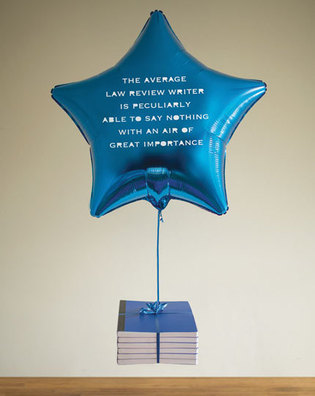 loading
loading
Arts & CultureLegal prose and verborrheaYou can quote them Yale law librarian Fred R. Shapiro is editor of the Yale Book of Quotations.  John Paul ChirdonView full imagePerhaps the greatest iconoclast in the history of legal education was Yale Law School professor Fred Rodell ’31LLB. Rodell had many critical things to say about many legal institutions, but his finest quip was his summation of legal writing: “There are two things wrong with almost all legal writing. One is its style. The other is its content.” Rodell was not the first to find lawyers’ prose a bit much. Thomas Jefferson, in an 1817 letter, apologized for the simplicity of a bill he had drafted: “You, however, can easily correct this bill to the taste of my brother lawyers, by making every other word a ‘said’ or ‘aforesaid,’ and saying everything over two or three times, so that nobody but we of the craft can untwist the diction, and find out what it means.” Another critic of legislative language was Judge Learned Hand. “The words of such an act as the Income Tax,” he wrote, “merely dance before my eyes in a meaningless procession: cross-reference to cross-reference, exception upon exception.… At times I cannot help recalling a saying of William James about certain passages of Hegel: that they were no doubt written with a passion of rationality; but that one cannot help wondering whether to the reader they have any significance save that the words are strung together with syntactical correctness.” Reed Dickerson, a guru of legal drafting, told this story about the all-too-familiar failures of that craft: “A business man was charged with violating a complicated regulation setting ceiling prices on the articles he sold. When he betrayed some unfamiliarity with the regulation, the judge asked him whether he had ever read it. The defendant replied indignantly, ‘Read it, Judge? I can’t even lift it!’” Verborrhea is found not only in legislative and administrative drafting, but in judicial writing as well. In 1979, the Law Library Journal recounted this anecdote: “One of Judge Jerome Frank’s law clerks objected to the length of one of his opinions. He spent all of a week and finally cut it down from sixty-five pages to one-half page. He left both on Judge Frank’s desk without comment. The following morning Judge Frank rushed into his clerk’s office and shouted, ‘Bully for you,’ displaying the clerk’s work. ‘We’ll add it to the end.’” This tale smacks completely of apocryphalness—except that the late Yale Law School professor Boris Bittker ’41LLB told me that it really happened. How did he know? He was the clerk. (Frank, a federal judge, also lectured at Yale.) The mangling of the English language begins, presumably, in law school. American University law professor Stephen Wermiel has cracked, “In the third year of law school, they ought to teach English as a Second Language.” The law school law review is virtually a boot camp of training in horrific composition. Rodell, as usual, said it best: “It is in the law reviews that a pennyworth of content is most frequently concealed beneath a pound of so-called style. The average law review writer is peculiarly able to say nothing with an air of great importance. When I used to read law reviews, I used constantly to be reminded of an elephant trying to swat a fly.”
The comment period has expired.
|
|